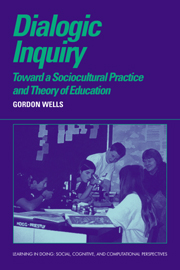Book contents
- Frontmatter
- Contents
- Conventions of Transcription
- Introduction
- Part I Establishing the Theoretical Framework
- Part II Discourse, Learning, and Teaching
- 4 Text, Talk, and Inquiry: Schooling As Semiotic Apprenticeship
- 5 Putting a Tool to Different Uses: A Reevaluation of the IRF Sequence
- 6 From Guessing to Predicting: Progressive Discourse in the Learning and Teaching of Science
- 7 Using the Tool-kit of Discourse in the Activity of Learning and Teaching
- 8 Making Meaning with Text: A Genetic Approach to the Mediating Role of Writing
- Part III Learning and Teaching in the zpd
- Appendix I A Social Constructivist Model of Learning and Teaching
- Appendix II Categories for the Analysis of Discourse
- References
- Index of Authors
- Index of Subjects
- Title in the series
4 - Text, Talk, and Inquiry: Schooling As Semiotic Apprenticeship
Published online by Cambridge University Press: 09 November 2009
- Frontmatter
- Contents
- Conventions of Transcription
- Introduction
- Part I Establishing the Theoretical Framework
- Part II Discourse, Learning, and Teaching
- 4 Text, Talk, and Inquiry: Schooling As Semiotic Apprenticeship
- 5 Putting a Tool to Different Uses: A Reevaluation of the IRF Sequence
- 6 From Guessing to Predicting: Progressive Discourse in the Learning and Teaching of Science
- 7 Using the Tool-kit of Discourse in the Activity of Learning and Teaching
- 8 Making Meaning with Text: A Genetic Approach to the Mediating Role of Writing
- Part III Learning and Teaching in the zpd
- Appendix I A Social Constructivist Model of Learning and Teaching
- Appendix II Categories for the Analysis of Discourse
- References
- Index of Authors
- Index of Subjects
- Title in the series
Summary
Many years ago, in Education and Experience, Dewey (1938) made a simple observation, but one whose implications for classroom practice have still to be taken seriously: Human beings learn by doing. At about the same time, but in a very different part of the world, a similar insight about learning through joint activity was being developed into a comprehensive theory of learning-and-teaching by Vygotsky and his colleagues and students (Vygotsky, 1978, 1987; Leont'ev, 1981; Luria, 1978). Having remained unknown outside the Soviet Union until their work began to be translated into English and other languages in the last couple of decades, the key ideas developed by this troika are now beginning to have a very considerable impact on education at all levels from preschool to teacher education.
Simply put, Vygotsky argued that each human being's capacities for acting, thinking, feeling and communicating, although based in his or her biological inheritance, are crucially dependent on the practices and artifacts, developed over time within particular cultures, that are appropriated in the course of goal-oriented joint activity. As Budilova puts it: “A special form of transmitting the achievements of preceding generations to the next takes place in human society; that is the achievements are embodied in the material and symbolic products of human activities, and specific human psychological abilities can be developed through the mastery of these products by each person” (1972, p. 310; translated and quoted by Amano, 1991).
Four features of this account merit further attention. First, the notion of “product,” or “artifact.”
- Type
- Chapter
- Information
- Dialogic InquiryTowards a Socio-cultural Practice and Theory of Education, pp. 135 - 166Publisher: Cambridge University PressPrint publication year: 1999



